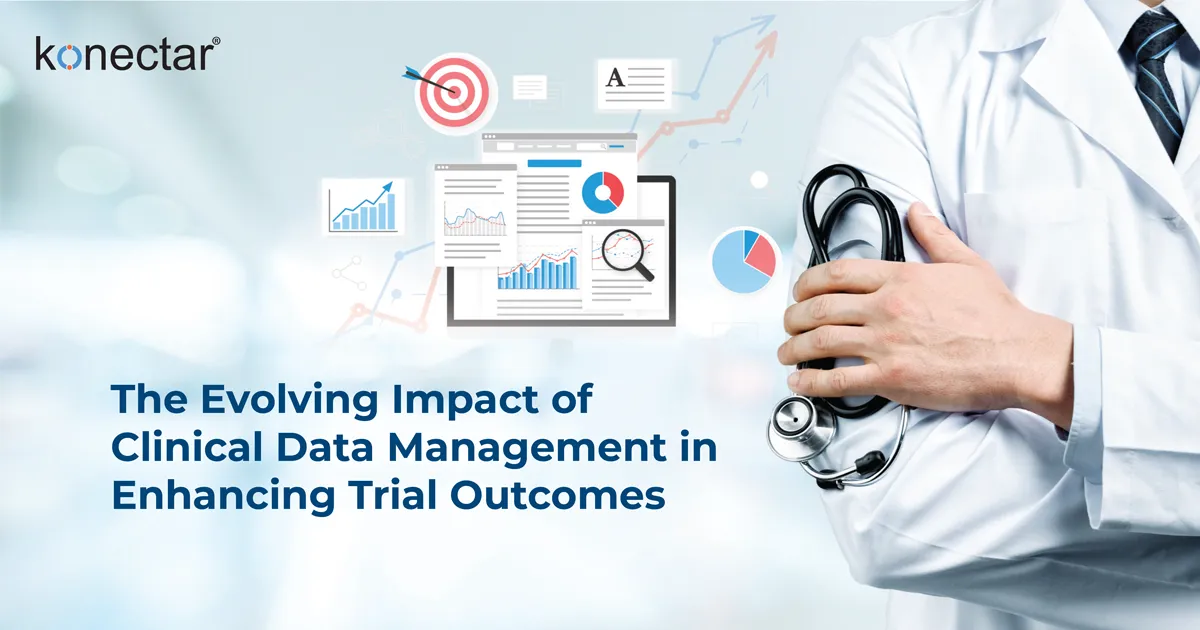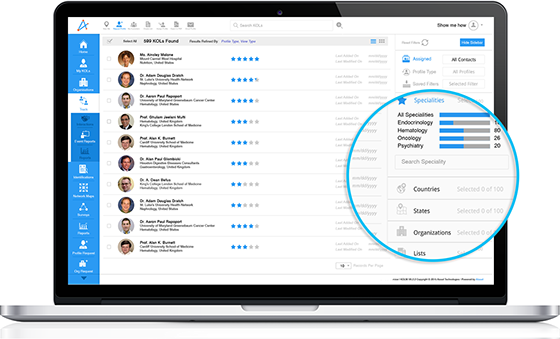12-12-2023
Evolving Impact of Clinical Data Management on Trial Outcomes

Clinical Data Management (CDM) is a crucial aspect of clinical trials that aids in understanding the value of research data. This is especially true with the increasing long-term data archiving, sharing, and reuse trend. Transparent CDM ensures the reliability of data as those referring to the data afterward usually rely on study protocols to interpret the datasets and assess their quality.
Therefore, thorough documentation of study data and associated processes through CDM becomes essential to guarantee the reusability and proper interpretation of data over time.
In this article:
- The Current Landscape of Clinical Data Management
- Data Governance and Security in Clinical Trial Data Management
- Emerging Technological Innovations
- FAQs
- Advancing Clinical Trials through Effective Data Management
The Current Landscape of Clinical Data Management
Over the past few years, there has been an exponential increase in Clinical Trials conducted worldwide. The traditional method of manually recording results on clipboards made way for precise data collection and management. The emergence of intelligent systems for data recording has transformed the clinical trials research process.
Clinical Data Management (CDM) today obtains data from a multitude of sources, such as Electronic Data Capture (EDC), Electronic Clinical Outcome Assessment (eCOA), central laboratory data, electrocardiograms (ECG), biosensors, wearable devices, and Electronic Health Records (EHRs). This diversified approach ensures participants' statistical data remains current and allows real-time information access.
Today, many Clinical Data Management Systems are available that facilitate intelligent management of data, leading data managers to navigate various tools. Trial sponsors are opting for centralized Data management, extending this approach to the technology they employ. This ensures uniformity and coherence across the board.
Simultaneously, smaller companies are increasingly outsourcing tasks to Functional Service Providers (FSPs). This strategic combination of implementing suitable software and partnering with an FSP cultivates an efficient and productive working environment. This has enabled life sciences companies engaged in clinical trials to document accurate data, reduce cost, shorten development time, and reduce research failures.
Interestingly, according to a study, the CDM systems market, which was valued at USD 2164.88 million, is slated to reach USD 6399.2 million by 2031. Further, the market is segmented based on Delivery and End-use. Delivery Mode comprises Licensed Enterprise Solutions, Cloud-based Solutions, and Web-hosted Solutions, whereas the End-Use segment involves Clinical Research Organizations (CROs), Medical Device Companies, and Pharma Companies.
Based on the delivery mode, it is estimated that cloud-based CDM systems will gain significant momentum due to their potential for low data loss, robust security, better management of data, and fewer regulatory compliance concerns. Based on the end-use mode, CROs are anticipated to rise faster. This is attributed to the fact that more and more companies will consider outsourcing their clinical trials to CROs as it results in lower drug development costs. Moreover, most CROs worldwide have employed Clinical Data Management to handle the vast volume of data.
Data Governance and Security in Clinical Trial Data Management
In clinical trials, Data Governance has a twofold role: protecting participant privacy and ensuring research accuracy. Striking this balance is crucial for upholding ethical standards and maintaining scientific credibility.
Collaborative structures involving diverse teams, such as researchers, data managers, IT specialists, and ethics committees, are instrumental in creating thorough data governance policies. These frameworks define specific roles, responsibilities, and procedures for managing, storing, sharing, and accessing data. Additionally, ensuring compliance with regulatory mandates, including data protection regulations and clinical trial standards, guarantees that data governance meets legal requirements.
Technological advancements, specifically the adoption of blockchain technology, have inherent features of immutability and transparency that offer a secure and tamper-resistant platform for storing and sharing data. This technology enhances data security by reducing the potential for unauthorized access and creating an audit trail for data transactions.
Emerging Technological Innovations
1. Blockchain Technology
Blockchain technology enhances clinical data quality and patient safety by automating processes and ensuring data integrity, availability, traceability, and reporting. In electronic trial master file (eTMF), blockchain facilitates document creation, review, approval, and archival in a secure chain.
2. Artificial Intelligence
Artificial Intelligence (AI) contributes to improved data management in clinical trials by detecting trends, identifying risks, predicting outcomes, and enabling standardization of clinical data. Machine Learning (ML) aids clinical data reconciliation and accelerates study onboarding and resource utilization. ML-driven data analysis identifies hidden patterns, facilitating proactive analysis, cleaning, and reporting.
Also, signal detection through ML helps in risk-benefit analysis, ensuring timely reporting of adverse events. Natural Language Processing (NLP) builds clinical data collection models in multiple languages, extracting insights from unstructured data like images, scans, and medical records. NLP techniques analyze sentiments and prescribing patterns in Real-World Evidence (RWE) studies.
3. Cloud computing
Cloud computing offers a scalable and secure platform for conducting clinical trials in adherence to compliance guidelines. Its centralized data storage and audit trail ensures efficient management of clinical data logistics.
FAQs
- What is Clinical Data Management?
Clinical data management involves systematically collecting, organizing, and analyzing data generated during clinical trials. It ensures trial data's accuracy, integrity, and compliance and forms the basis of credible research outcomes.
- What is a Clinical Trial Data Management System?
A Clinical Trial Data Management System (CTDMS) is software designed to facilitate the collection, cleaning, and management of data throughout the entire lifecycle of a clinical trial. It ensures efficient data handling, reducing errors and enhancing overall data quality.
- Why is Data Management Crucial in Clinical Trials?
Data management is crucial in clinical trials because it ensures the reliability and integrity of trial data. It supports accurate analysis, meets regulatory standards, and forms the basis for trustworthy research conclusions.
- How is Data Quality Maintained During Clinical Trials?
Data quality in clinical trials is maintained through rigorous monitoring, validation checks, and adherence to standardized protocols. Regular audits, consistency checks, and thorough documentation contribute to maintaining high data quality throughout the trial.
- What Does a Clinical Data Management Training Program Cover?
A clinical data management training program typically covers various topics, including regulatory requirements, data entry and cleaning procedures, utilization of data management software, and adherence to ethical standards. Training programs equip Healthcare Professionals with the essential skills needed to manage clinical trial data effectively.
Advancing Clinical Trials through Effective Data Management
The goal of a clinical trial is to gather high-quality clinical data that demonstrates efficacy and safety and speed up the introduction of new drugs to the market. Regulatory bodies, including drug regulatory agencies, depend significantly on robust clinical trial data to assess the safety and effectiveness of a new intervention. Clinical Data Management in this context is a valuable tool for researchers, statisticians, and regulators, enabling them to assess treatment effectiveness and safety. It also helps to guide decisions throughout drug development, from designing protocols to entering the market.





